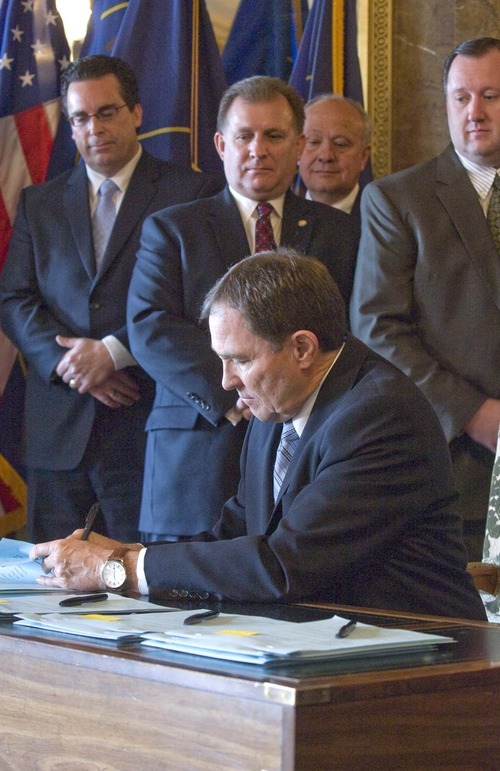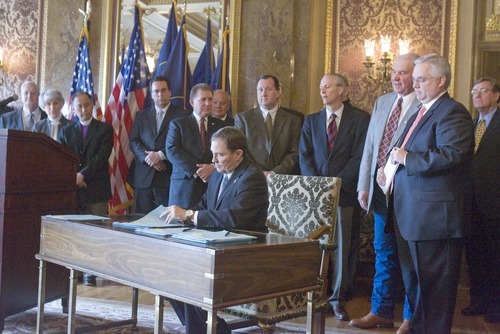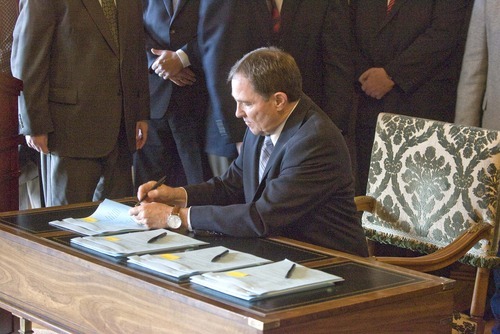This is an archived article that was published on sltrib.com in 2011, and information in the article may be outdated. It is provided only for personal research purposes and may not be reprinted.
Gov. Gary Herbert signed four immigration reform bills in a semiprivate ceremony at the Capitol on Tuesday — officially marking Utah's attempt to pioneer a path on the hot-button issue by challenging federal sovereignty through the authorization of guest-worker permits.
If successful, state politicians believe the laws could lay a foundation for a national solution to the complicated issue. If they fail, Utah will likely become just another state embroiled in litigation over the federal government's claim to sole responsibility in setting immigration policy.
Either way, Herbert said, the feds have been put on notice.
"Part of the overall strategy here is to, in fact, force the federal government to engage," Herbert said. "They've been on the sidelines way too long. They need to get in the game."
By signing the quartet of bills, Herbert may have also put his political future at risk.
Prior to Tuesday's signing, a group of tea-party activists and state Republican delegates delivered a petition asking him to veto HB116 — the guest-worker bill carried by Rep. Bill Wright, R-Holden. An online petition collected 4,500 signatures in six days, according to Brandon Beckham, a state GOP delegate from Orem. Beckham, who helped organized close to 100 other delegates who met with Herbert last week, said he is orchestrating a campaign to repeal the law.
And David Kirkham, one of the architects of the tea-party movement in Utah, was even more blunt about the governor.
"The campaign started today," he said. "He [Herbert] will be challenged, and we will be actively supporting someone else."
But the governor, who faces re-election in 2012, said he was pleased with the overall results and that it was a multifaceted approach that hews closely to his six guiding principles, as well as the Utah Compact developed by community, business and religious leaders. He took issue with those who cry "amnesty" by saying the guest-worker law "was not a get-out-of-jail-free card."
He noted the new laws cover everything from enforcement to employment — including one that uses the existing federal government visa system.
"They [the laws] need to be taken as a whole," Herbert said. "[They are] complementary efforts to address immigration reform as it's needed in today's time and place in Utah."
The guest-worker law established by HB116, which won't take effect for two years and gives the state time to work with the federal government before engaging in legal tangles, would allow any of the roughly 110,000 undocumented people in the state to acquire permits by paying either a $2,500 fine or a $1,000 fine if overstaying a visa.
It would also allow permits to cover families and keep them together, an important component endorsed by the LDS Church. The visas would be issued through the Utah Department of Public Safety and would require criminal-background checks. Learning English would be encouraged but not mandated.
Support for the laws covered a broad spectrum at the signing ceremony in the Gold Room at the Capitol. Herbert was flanked by House Speaker Becky Lockhart, Senate President Michael Waddoups, LDS Presiding Bishop H. David Burton and Sen. Curt Bramble, R-Provo, a key player in putting the comprehensive approach together.
Polar opposites on immigration reform — Sutherland Institute President Paul Mero and Eagle Forum head Gayle Ruzicka — also looked on when Herbert inked the bills.
Rep. Stephen Sandstrom, R-Orem, who authored the enforcement-only immigration bill, HB497, drove to the Capitol to appear at the signing, but at the last minute, he bowed out because he didn't want to be perceived as backing the comprehensive laws.
"I am very pleased the governor signed my bills," Sandstrom said. "But the more I thought about it — you know that perception is reality — I didn't want my presence there making it appear as if I supported the guest-worker bill."
Also absent was Sen. Luz Robles, D-Salt Lake City, who was involved with aspects of the guest-worker bill and carried a similar measure that ultimately died in the Senate. Robles was going to attend but had to miss the ceremony because of her daughter's illness.
Because of the guest-worker law's two-year lag before kicking in, state officials are already talking with White House and congressional officials to use Utah's approach as a model for federal immigration reform.
Waddoups said it was important to note that all four laws must be considered collectively as the "Utah Solution" to immigration reform.
"This is not amnesty. This is not profiling," Waddoups said. "This is not an Oklahoma solution. This is not an Arizona solution. This is not a Missouri solution. [There are] three states that have led out on immigration to a degree. We are not following their path."
One of the reasons Utah has forged this path on immigration reform is the Utah Compact and the LDS Church's endorsement of the set of principles seeking a humane approach to immigration reform.
The other two measures signed by Herbert were HB466, a migrant-worker bill sponsored by Sandstrom and Bramble that aims to enter Utah into a partnership with the Mexican state of Nuevo Leon, with the federal government issuing visas for workers to come to the state legally; and HB469, by Rep. John Dougall, R-Highland.
HB469 will allow Utahns to sponsor an immigrant from another country, though it has come under fire by several groups, including the American Civil Liberties Union, that say it will likely be challenged as unconstitutional.
dmontero@sltrib.com Utah's new immigration laws
HB116 • Authorizes a guest-worker program beginning in two years that will allow undocumented people to pay fines and stay. Could be challenged as infringing on federal authority.
HB497 • Requires local police to check the legal status of those arrested on felony or serious misdemeanor charges.
HB466 • Establishes a partnership with the Mexican state of Nuevo Leon to allow workers to come to Utah using federal visas.
HB469 • Allows Utah citizens to sponsor immigrants. Could be challenged.







